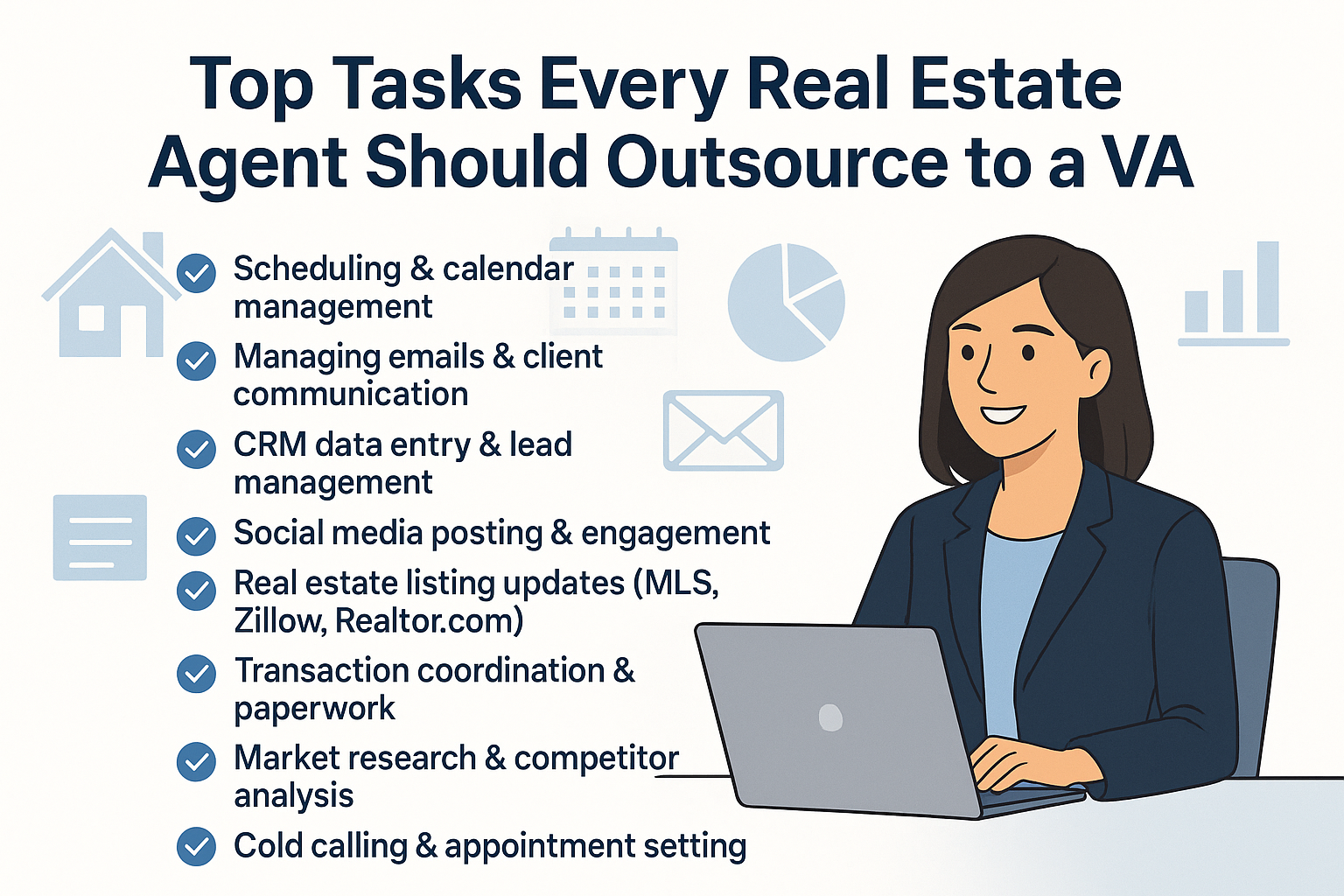


The life of a real estate agent is exciting but let’s face it, it’s also overwhelming. Between chasing leads, managing listings, scheduling appointments, and closing deals, there never seems to be enough hours in the day. That’s where outsourcing comes into play. By hiring a real estate virtual assistant (VA), you can free yourself from repetitive tasks and focus on what you do best: selling homes and building strong client relationships.
In today’s competitive market, agents who know how to delegate effectively not only save time but also scale their businesses faster. This article breaks down the top tasks every real estate agent should outsource to a VA, plus tips for hiring and managing one successfully.
A real estate VA is a remote professional who specializes in handling administrative, marketing, and client-support tasks for agents and brokerages. Unlike a traditional assistant, VAs work remotely, often on flexible schedules, and typically cost less than hiring full-time staff.
They can handle everything from data entry to cold calling, depending on your business needs. The best part? You pay only for the hours or tasks completed, making it a cost-effective solution.
Hiring an in-house assistant means paying salary, benefits, insurance, and office space costs. A VA eliminates those overhead expenses while still delivering professional support.
With a VA handling routine tasks, agents gain back valuable hours. Instead of being buried in emails or paperwork, you can focus on nurturing leads, attending showings, and networking.
Real estate is a relationship-driven business. Outsourcing allows agents to focus on revenue-generating activities like negotiating, closing deals, and client care.
VAs can manage your calendar, schedule showings, coordinate with clients, and send reminders. This ensures you never miss an important appointment.
A cluttered inbox is a productivity killer. VAs can filter emails, draft responses, and keep communication flowing smoothly with buyers, sellers, and other agents.
Keeping your CRM updated is crucial, but time-consuming. A VA can input leads, update contact information, and track follow-ups—ensuring no lead slips through the cracks.
From Instagram reels to Facebook ads, social media is essential for real estate marketing. A VA can schedule posts, design graphics, and engage with your audience.
Uploading new listings, updating photos, and refreshing descriptions can be outsourced to a VA so you can focus on selling instead of formatting.
Real estate transactions come with endless contracts, disclosures, and deadlines. VAs can serve as transaction coordinators, ensuring documents are completed and submitted on time.
Need to know what homes in your area are selling for? A VA can compile market reports, analyze competitor listings, and prepare insights for your client presentations.
Some VAs specialize in lead generation. They can make cold calls, qualify prospects, and set appointments—saving you hours each week.
From designing open house flyers to running email drip campaigns, a VA can handle your marketing outreach while you close deals.
Real estate agents juggle multiple expenses. A VA with bookkeeping skills can track receipts, update spreadsheets, and prepare financial reports.
Define your workflows and create standard operating procedures (SOPs) so your VA knows exactly what to do.
Collaborate in real time with task boards and shared project trackers.
Regular check-ins keep everyone aligned and reduce misunderstandings.
Depending on their location and experience, real estate VAs cost between $8–$25 per hour. U.S.-based VAs are pricier, while offshore professionals are more affordable yet equally skilled.
Q1: How many hours per week should I hire a VA for?
Most agents start with 20–40 hours per week and scale as needed.
Q2: Do I need to provide tools and software for my VA?
Yes, especially if they’ll use your CRM or marketing platforms.
Q3: Can VAs make cold calls legally?
Yes, but always ensure compliance with local telemarketing laws.
Q4: How do I train a real estate VA?
Provide SOPs, recorded walkthroughs, and weekly check-ins.
Q5: What’s the difference between a general VA and a real estate VA?
General VAs handle admin work, while real estate VAs are trained in property listings, CRM systems, and transaction coordination.
Q6: Can a VA help me scale my real estate business?
Absolutely! By handling repetitive tasks, they free you up to focus on lead generation and closing deals.
The most successful real estate agents know that time is money. By outsourcing the right tasks to a skilled VA, you can reclaim your time, boost productivity, and close more deals. Whether it’s admin support, social media management, or transaction coordination, a VA is the key to growing your business without burning out.
If you’re ready to scale, start small, set clear expectations, and gradually expand your VA’s responsibilities. Before long, you’ll wonder how you ever managed without one.
Related Resource: National Association of Realtors – Productivity Tips
